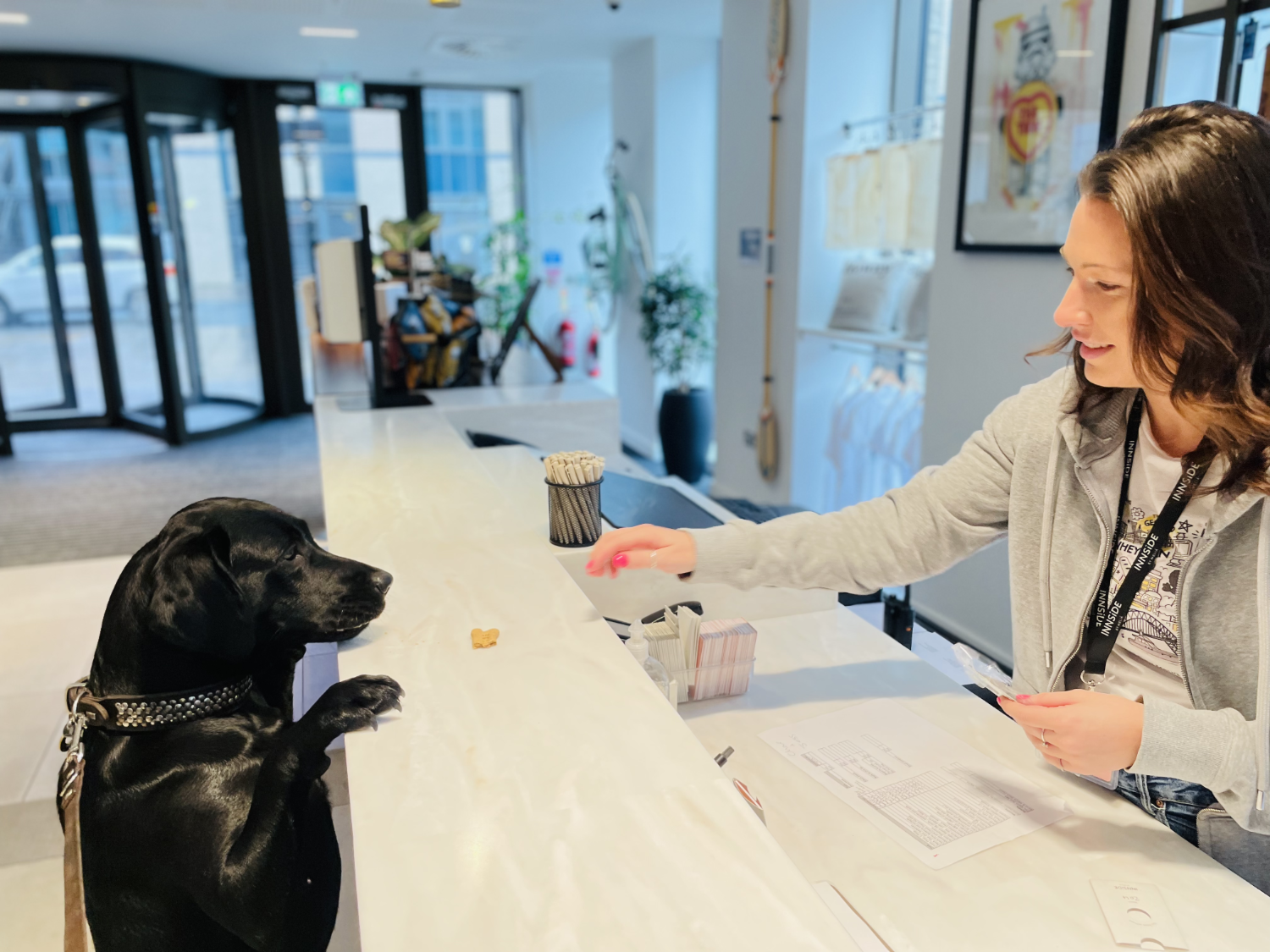Leveraging the Growing Demand for Dog-Friendly Accommodation: Practical Insights for the Hotel Industry
The market for dog-friendly accommodation is booming; in this research analysis, we examine a recently published academic paper to glean some actionable insights and practical advice for hotels who want to attract dog owners.

Welcome to my latest research analysis, where I deep dive into recently published academic research on subjects that interest me, this time we are taking a closer look at research published by Dr. Lori Hoy, PhD, entitled "Dog-Friendly Accommodation: Specialty OTAs and Decision-Making. It is an academically dense piece of research written for other academics, so it can be a little difficult to parse, which is why I write up these analyses so that we can better understand them.
This research paper is important because the dog-friendly travel market is rapidly expanding, and hotel owners must understand the unique needs of dog-owning travelers if they hope to attract this lucrative customer segment. It provides valuable insights into the growing demand for dog-friendly accommodations and the decision-making processes of dog owners when they are trip-planning. My analysis will glean all the actionable nuggets of information and practical insights we can extract from this research study and examine them more closely.
The Booming Market for Dog-Friendly Accommodations
The market for dog-friendly accommodations is experiencing robust growth, driven by increasing dog ownership, particularly among Millennials and Gen Xers, who now own more dogs than any other generation. In 2022, the market was valued at USD 1.96 billion and is expected to reach USD 4.1 billion by 2032, growing at a compound annual growth rate (CAGR) of 9.5%. This growth is spurred by the strong bonds these generations have formed with their dogs, who view them as family members and prioritize their needs when planning travel.
The hotel industry is waking up to the $259 billion annual budget that dog owners spend on their dogs. Increasingly, hotel brands are turning away from calling themselves pet-friendly and rebranding themselves as dog-friendly in a strategic effort to attract dog owners to their properties. By changing their language and rolling out canine-focused services and amenities, hotels can position themselves to attract dog owners who no longer trust the words “pet friendly.”
This soaring demand for dog-friendly accommodations is expected to continue rising, supported by emerging trends such as pet tourism and the increasing use of social media to share pet travel experiences. Advancements in pet travel services providing dog-friendly transportation options, and dog friendly hotel directories, make it easier for dog owners to find suitable accommodations.
Key Challenges for Dog-Owning Travelers
The research indicates that traveling with dogs presents several challenges for dog owners; these include limited information, insufficient suitable accommodations, and unclear additional fees and restrictions. Many properties that claim to be pet-friendly offer limited facilities, charge high fees, or have strict rules, which can be tremendously inconvenient and frustrating for dog owners.
We need better standards, and certification, for dog-friendly hotels.
Research indicates that while many hotels call themselves "pet-friendly," the reality often falls short. For instance, some accommodations might only allow very small dogs, or they may charge high fees that are not communicated upfront. This has led to frustration and dissatisfaction among dog-owning travelers. Hotels that go the extra mile by providing detailed, transparent, and easily accessible information about their dog-friendly policies and adopting dog-friendly language can stand out to dog owners in the crowded "pet-friendly" hotel marketplace.
Influences on Decision-Making: Emotional and Logical Factors
Using the Cognitive-Experiential Self-Theory (CEST), the study explores how both emotional factors (like the perceived well-being benefits of traveling with pets) and logical factors (such as trust in the OTA and attitudes toward risk) influence decision-making. Travelers who believe that traveling with their dogs improves their well-being are more likely to have a positive attitude towards using specialized OTAs, regardless of their experience level with dog-friendly travel.
Trust in the online travel agent and clear, reliable, granular information are critical in alleviating risk and encouraging bookings for dog owners, who need to know what to expect in terms of policies, services, and amenities before they book.
Interestingly, the study found that even seasoned travelers who are well-versed in finding dog-friendly accommodations still place high value on trust and detailed information provided by specialty OTAs like Roch. This suggests that emotional attachment to dogs can significantly influence decision-making processes.
Hotels and OTAs that emphasize the health and emotional benefits of traveling with dogs in their marketing materials can create a strong emotional connection with potential guests. Offering assurances such as no hidden fees and providing dog-friendly services and amenities can mitigate the perceived risks and foster trust, making it easier for travelers to choose and book their accommodations.
Practical Recommendations for Hotels
Below are the practical recommendations that I could glean from the Dr H0ys research study that you can strategically to work in your hotel to attract the lucrative dog-owning segment, willing to pay a premium for dog-friendly.
1. Enhance Transparency and Detail
Clear Listings: Ensure that all pet policies, fees, services, and amenities are detailed and easy to find on your website. Transparency can attract bookings by providing dog owners with the information they need to make informed decisions.
Feature Highlights: Promote features that cater to dog owners, such as nearby walking areas and dog-friendly dining options. Be sure to offer basic amenities like beds, food and water bowls, dog food, and free treats to win the dog's loyalty.
User Experience: Incorporate user-generated content such as reviews and ratings related to dog-friendliness. This peer feedback can be a powerful tool in reassuring dog owners about the quality and reliability of your property.
2. Achieve 3rd Party Certification:
Third-Party Certifications: Obtain certifications from independent third parties like Ranked By Roch. These certifications can help guests understand what to expect and distinguish your property as dog-friendly in a pet-friendly world.
Standardized Ratings: Encourage the development of a standardized rating system for pet-friendly accommodations. This can help create industry-wide benchmarks and make it easier for travelers to compare different properties.
Collaborations: Partner with dog-friendly organizations and influencers to promote your certification and dog-friendly status, this can enhance your credibility and reach within the dog-owning community.
3. Highlight Well-Being Benefits:
Emotional Appeal: Use imagery and text to showcase the well-being benefits of traveling with pets. Highlight how your hotel caters to the physical, social, and mental well-being of the dogs and their owners when they stay with you.
Positive Reviews: Showcase positive reviews from guests who have previously stayed at your hotel with their dogs, emphasizing their positive experiences and satisfaction with your accommodations, services, and amenities.
Holistic Approach: Create marketing campaigns that emphasize a holistic approach to well-being, incorporating outdoor activities, dog-friendly social events, and wellness amenities for dogs and their owners.
4. Increase Awareness:
Marketing Efforts: Focus on raising awareness of your canine inclusivity and dog friendliness through online marketing to dog owners, dog-related festivals, and PR opportunities such as guest blogs and stays by “doggy influencers.”
Loyalty Programs: Consider implementing loyalty programs that offer special benefits to guests traveling with dogs, encouraging repeat visits and long-term loyalty, like a one-time fee, which, paid once, entitles the dog to stay free for life.
Community Engagement: Engage with local dog owner communities and organizations to promote your hotel as a top choice for dog-friendly travel. The more you engage with dog owners, the more they will recommend you to others.
By addressing the unique needs of dog-owning travelers and by adapting their language to attract dog owners, hotels lean into the dog-friendly accommodation boom, significantly enhance customer satisfaction, and drive more bookings. Implementing these research-based insights and strategies will help you serve this growing market segment more effectively, unlocking new growth opportunities and setting your property apart as a preferred destination for dog-friendly travel.
This proactive approach will help you meet the current demand and position your hotel as a dog-friendly leader in a cluttered pet-friendly landscape.
Read the original research paper here, and please give its author a follow on LinkedIn, Dr. Hoy is the world's leading academic expert on dog-friendly travel, accommodation, and hospitality, and a member of the Roch Advisory Board.


